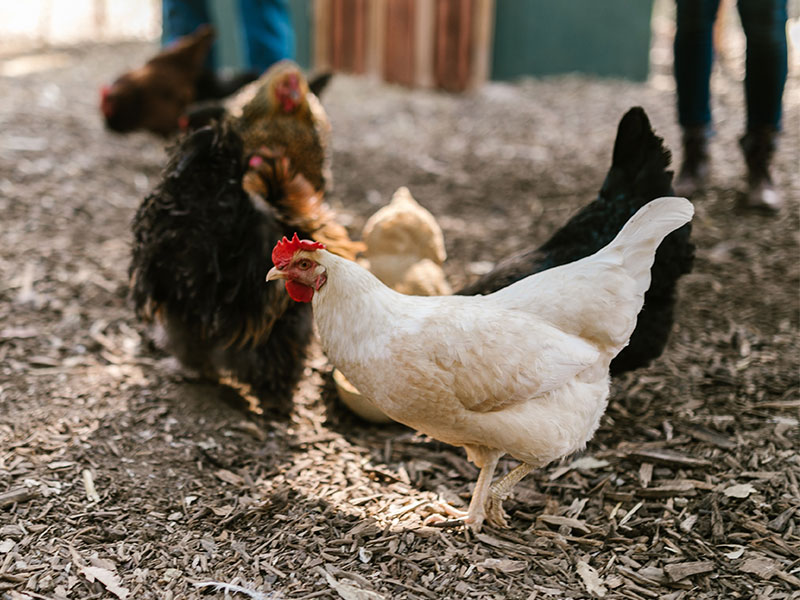Protect Your Flock Against Highly Pathogenic Avian Influenza
Friday, October 7, 2022
 Cases of Highly Pathogenic Avian Influenza are spreading rapidly. There are cases
in Colorado, Kansas, Arkansas and New Mexico affecting both commercial and backyard
poultry. This disease is deadly to domestic poultry.
Cases of Highly Pathogenic Avian Influenza are spreading rapidly. There are cases
in Colorado, Kansas, Arkansas and New Mexico affecting both commercial and backyard
poultry. This disease is deadly to domestic poultry.
As the illness spreads, it is crucial to maintain and increase biosecurity measures while minimizing exposure to wild waterfowl as much as possible. Transmission of avian influenza primarily occurs through the feces and respiratory secretions of birds. Fecal-oral and respiratory transmission can rapidly spread the virus through a flock, but clothes, shoes, equipment, pests and vehicles can also be major sources of transmission.
Tips for maintaining biosecurity in backyard poultry:
- Keep your distance and restrict visitors. The primary caretaker of the flock should not enter other poultry facilities and visitors should be kept at a minimum. Any necessary visitors should clean and disinfect their shoes or wear disposable boot covers prior to entering any pen. If handling birds, disposable gloves should also be worn.
- Do not allow wild birds to commingle with domesticated poultry. Game birds and migratory waterfowl can carry diseases that can be spread to domesticated poultry. At all costs, keep wild birds from coming in contact with the flock—even if they are housed outdoors. Be sure no other animals or pets come in contact with poultry or feeding and watering receptacles.
- Maintain cleanliness! Clean and disinfect your hands, clothes, shoes and equipment before and after handling poultry. A good biosecurity practice is to have a pair of shoes that are kept next to the pen door and only worn when inside the pen. Feed bins should be secured to prevent contamination by wild birds or rodents. Spoiled feed should be removed promptly to prevent attracting wild birds or rodents. Clean and disinfect all tools and equipment thought to have been contaminated. Promptly dispose of dead birds by burial or composting. Maintain effective rodent and insect control programs.
- Don’t haul the disease home. If your birds have been near other poultry such as during a show or contest, clean and disinfect poultry cages and equipment before coming home. Birds that have been near other poultry should be quarantined from the rest of the flock for 14 days. This will give the bird time to show sickness. New birds should be kept from your flock for at least 30 days before putting them with the rest of the birds. After com- ing into contact with other birds, be sure to shower and wash clothing before handling your birds.
- Be neighborly, but don’t risk disease! The health of your birds should be first priority. Do not share birds, borrow lawn and garden equipment, tools or poultry supplies from other bird owners. Items that cannot be disinfected such as wood pallets or egg cartons should not be shared.
- Know the warning signs. Birds infected with HPAI may exhibit lack of energy and appetite, decreased egg production, abnormal egg shape, respiratory distress, diarrhea and swelling or purple discoloration of the head, eyelids, comb, wattles and legs.
- Report sick birds. Keep in mind that isolated instances of mortality are common in a backyard flock and do not require reporting. However, be aware that drastic instances of sickness and mortality in large numbers of birds should be reported to officials. Prompt diagnosis of widespread sickness in flocks is a critical step in containing any devastating disease. For diagnosis of any widespread disease, contact the Oklahoma Animal Disease Diagnostic Laboratory. The OADDL works closely with the Oklahoma Department of Agriculture to test and identify contagious diseases. If avian influenza is suspected in an Oklahoma backyard poultry flock, please contact your local veterinarian immediately.
For more information on avian influenza and biosecurity, visit https://extension.okstate.edu/fact-sheets/small-flock-biosecurity-for-prevention-of-avian-influenza.html.
